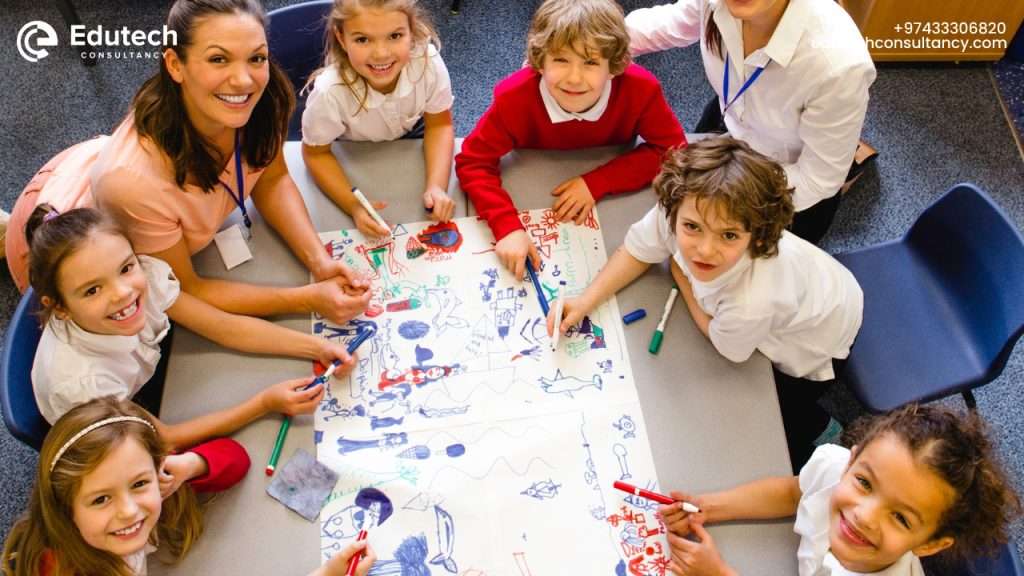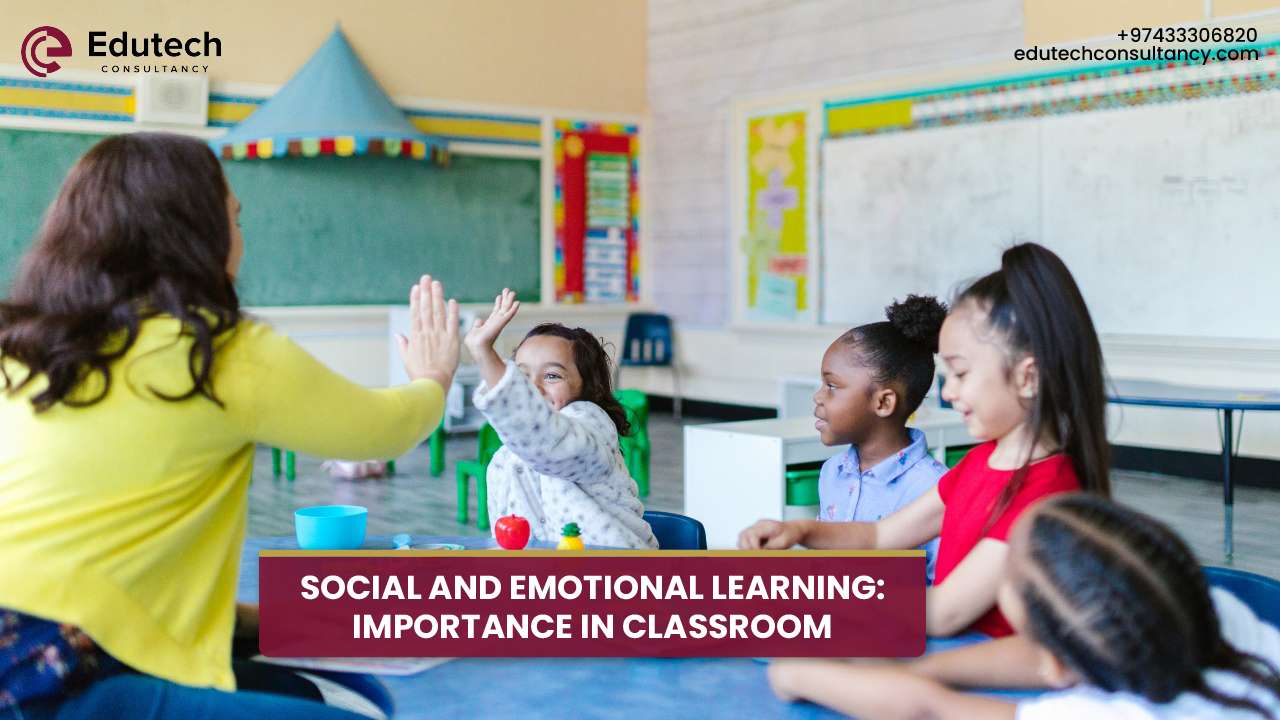Social and Emotional Learning (SEL) are three words that encompass the social and emotional needs of children. While teachers try to fulfill the academic development of children, the importance of SEL cannot be overstated. It’s merely because education gives every child the knowledge to succeed in grades. Consequently social and emotional learning helps students build essential life skills.
Through SEL, children learn to manage their emotions. Without a doubt, they can maintain positive relationships and develop empathy and self-awareness with compassion. Ultimately, this brings them forth towards academic and personal success.
Today in this blog, we will discuss what SEL is, why it is crucial for children and how teachers can play their part in helping their students develop such life skills.
What is Social and Emotional Learning (SEL)?
Social and emotional learning is the development of knowledge and attitudes that help manage emotions. Additionally, these skills teach a person how to build positive relationships while making responsible decisions. Moreover, teaching children how to become better friends, show compassion or learn to manage emotions is part of SEL. Furthermore, with this knowledge based on essential life skills, students can successfully deal with the sad and angry times, learn to be respectful, and build self-esteem.
Why is Social and Emotional Learning SEL necessary?
SEL helps children have the ability to face life challenges. When students lack sound social and emotional learning, they may go through difficulties in terms of well-being and academic success. However, SEL is considered a natural developmental process in a child’s life course. Still, some children fail to master these skills naturally, and when not taught, they might often show behavioral problems, which consequently hinder their abilities in learning at school and across that.

Here is a list of problems that might occur if students/children don’t get the required skills for SEL.
- Children become weak at emotional regulation: Shown in the form of emotional outbursts, withdrawal, or trouble handling difficult situations.
- Academic progress is affected: Issues of emotional instability decrease their concentration and focus on studies.
- Face difficulty in building relationships: Students who lack empathy and collaboration find developing and maintaining friendships challenging and end up in social isolation.
- Behavioral problems: Impulsive and disruptive behaviors present as the main issues with children lacking SEL.
- Limitation in problem-solving skills: SEL teaches responsible decision-making. Students may struggle to evaluate situations well and navigate likewise without these skills.
- Challenges in practical life: The absence of SEL disturbs long-term life success. Additionally, poorly developed social and emotional skills make it challenging for individuals to navigate personal relationships or handle the challenges of practical life.
The core SEL aptitudes:
Social-Emotional Learning helps children develop the skills they need to direct life effectively.

The five core aptitudes of SEL are:
1. Self-Awareness
The ability to understand one’s own emotions, thoughts, and behaviors defines self-awareness. In addition, recognizing personal strengths and weaknesses is the base of how well one’s actions affect others.
2. Self-Management
While self-awareness is the ability to understand, self-management encompasses regulating such emotions. Thus, setting goals, managing stress constructively, or including healthy choices in channeling emotions are the most effective traits to teach children.
3. Social Awareness
The ability to understand others’ emotions is known as social awareness. Taking another perspective with compassion and understanding the diversity around them makes students aware of how to take account of others’ ideas empathetically.
4. Relationship Skills
Maintaining healthy relationships with peers, teachers, seniors, or even juniors is always important to teach. Also, the root of building healthy relationships is explaining the importance of communication, cooperation, and conflict resolution.
5. Responsible Decision-Making
Teachers must teach students the traits of informed decision-making. Because, making choices and taking one’s actions under consideration improve critical thinking, problem-solving, and ethical reasoning abilities.
These attributes prepare students with skills that surpass classroom learning. However, these skills form the base of children who grow into well-rounded individuals capable of handling stress, building relationships, and contributing confidently to society.
Benefits of Social and Emotional Learning in the Classroom
1. Better Academic Performance
By teaching emotional regulation and social interaction, SEL enhances focus and reduces stress, allowing students to engage more fully in their learning.
2. Heightened Emotional Well-being
SEL equips students with the tools to understand and manage their emotions. As a result, in a safe and supported learning environment, students build better emotional resilience and can handle stress and anxiety better.
3. Better Social Relationships
Through SEL, students learn to develop positive relationships with peers and teachers. They get an opportunity to collaborate and respect the classroom environment. Therefore, it promotes inclusivity and better conflict resolution in students.
4. Lifelong Skills
SEL is not a short-term success. Whereas it provides academic benefits—it equips students with lifelong skills such as emotional intelligence, empathy, conflict resolution, and responsible decision-making.
Conclusion
Integrating Social and Emotional Learning into educational environments is a potent way to ensure students develop emotional intelligence. Furthermore, they will achieve the resilience they need to move through life’s challenges. Therefore, these are some of the strategies that improve student outcomes academically, socially, and emotionally. Also, SEL helps build future generations that succeed academically and have the skills needed to grow well in terms of life skills.
To learn more about SEL in children and how teachers can develop the essential skills of self-awareness and compassion in their students, we invite you to enroll in the Social and Emotional Workshop by Edutech Consultancy in Qatar.
Enroll yourself for a workshop that will give you in-depth knowledge about the proven teaching practices that work.
FAQs
What is the central role of Social and Emotional Learning?
SEL ensures a holistically developed individual with the needed emotional intelligence, self-regulation, and social skills, enabling them to succeed in school and personal life.
How can SEL be integrated into all subjects?
SEL can be included as part of every subject in the classroom. For example, group work in any project can make students understand the importance of teamwork and communication skills.
What benefits does SEL serve?
SEL can present both short-term and long-term benefits in children. Improved classroom behavior is one such example. Additionally, emotional intelligence and better academic performance can be a fruitful benefit in the long term.
How long does it take to see the results of SEL in students?
There is no definite timeline for students’ learning, which may vary depending on the consistency and quality of the SEL program.


